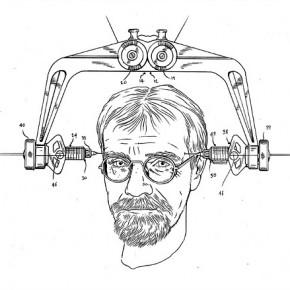
This week we slip into the mind of George Saunders, contemporary and friend to the late DFW, and colleague of Mary Karr at Syracuse University. “Winky,” a very short story, was published here in the New Yorker for you to read in full (if you are a subscriber), or you could just buy the collection of stories (highly recommended), Pastoralia.
“I’m lost!” You cried. “I’m wandering in a sort of wilderness!”
“Hey, You, come on over!” shouted a girl across the stage, labeled “Inner Peace.” “I bet you’ve been looking for me your whole life!”
“Boy, have I!” said You. “I’ll be right over!”
But then out from the wings sprinted a number of other actors, labeled “Whiny” and “Self-Absorbed” and “Blames Her Fat On Others” and so on, who draped themselves across You and began poking him in the ribs and giving him noogies.
“Oh, I can’t believe you love Inner Peace more than you love me, You!” said Insecure. “That really hurts.”
“Frankly, I’ve never been so disappointed in my life,” said Disappointed.
“Oh God, all this arguing is giving me a panic attack,” said Too High-Strung to Function.
“I’m waiting, You,” said Inner Peace. “Do you want me or not?”
“I do, but I seem to be trapped!” You shouted. “I can’t seem to get what I want!”
“You and about a billion other people in this world,” said Inner Peace sadly.
So begins the first pages of “Winky,” at a self-help conference with a stage demonstration and a tape-deck fanfare. The mantra for this conference that “You” (above) must repeat as an “internal reminder” is this: “Now Is the Time for Me to Win!” Among the crowd is our protagonist, bald, moustache-chewing loafer Neil Yaniky, who has come to the conference to gather the strength to finally boot Winky—his “crazy-looking and too religious” sister—from his apartment.
In the opening scene, the “Seminar” is a typical name-and-claim kind of environment in which Neil is conveniently given the solutions to the problems of his life—an easy mantra, an easy scapegoat—and, with the ocean of possibility now spread wide before him, he can be the Someone he has always wanted to be. For the self-help guru, Tom Rodgers (great name), we arise from the womb as an unadulterated, purified bowl of “warm oatmeal.” We cease to be that purely distilled bran when someone “craps in our bowl of oatmeal”—we become victims of other people’s crap, and so we must denounce them, because Now Is the Time for Me to Win! Rodgers uses a personal illustration that his handicapped brother, Gene, kept him from achieving his goals. Eventually he ceased helping Gene, so he could follow his own dreams:
“Are you ready to screen off your metaphorical oatmeal and identify your own personal Gene? Who is it that’s screwing you up? Who’s keeping you from getting what you want? Somebody is! God doesn’t make junk. If you’re losing, somebody’s doing it to you. Today I’ll be guiding you through my Three Essential Steps: Identification, Screening, Confrontation. First, we’ll Identify your personal Gene. Second, we’ll help you mentally install a metaphorical Screen over your symbolic oatmeal. Finally, we’ll show you how to Confront your personal Gene and make it clear to him or her that your oatmeal is henceforth off-limits.”
…He crisply left the stage and a spotlight panned across five Personal Change Centers, small white tents set up in a row near the fire door.
Unedited, technical detailing—reminiscent of DFW—follows Neil Yaniky into Personal Change Center #4. Tom Rodgers asks him about Winky, to which they decide together that the sister’s presence in Neil’s life is “a stumbling block for his personal development.” The personal philosophy humorously delivered from Tom Rodgers is one of unhinged and unrestrained self-fulfillment. In reference to Winky’s Christian faith, Rodgers word-spars with Jesus, noting that the truth will set Winky free—“Didn’t someone once say that? Wasn’t it God or Christ?”—that kicking her out is “letting her fly”, giving her her chance to dream big. Not saying something, not “speaking the truth in love,” as it were, means that there is co-dependent oatmeal-crapping: Winky continues to crap in Neil’s oatmeal, and Neil is crapping in Winky’s, by not freeing her of her neediness. In short, Rodgers represents the inner-Personal Change Centers, the glory-stories we turn up to turn down the sadder voices of reality. Saunders makes immaculately simple work of this: lodging the instrumentation of all human love and longing into a self-help conference, a baseball bat, and a mannequin.
Saunders then introduces us to the world of Winky. Like Benjy or Prince Myshkin, we follow her focus on the window outside, her focused trip up the stairs, her distraction with the wallpaper, her idea for a “Songs for God” record she wants to make, her forgetful trip back down the stairs, her silly self-reprimand, her trip back up the stairs, her remembrance of Neil-Neil’s arrival, and his love for tea, the sock that still sits on her shoulder, never making it to the laundry hamper. She is a lovable idiot, in the truest sense of the word. She is time-less. She does not see a preparative sense of the present any more than she remembers the kitchen is a disaster and she’s cleaning plates with her clean, green shirt. She simply does not remember. She cannot register Neil-Neil’s resentment, nor her encroaching expulsion from his apartment, nor the expulsion from her previous living situation. She sees her brother in unmottled affection:
Neil-Neil was the all-time sweetie pie. Those girls were crazy! Did they think because a man was small and bald he had no love? Did they think bad things came in small packages? Neil-Neil was like the good brother in the Bible, the one who stayed home with his dad on the farm and never got even a small party. Except there was no bad brother, it was just the two of them, so no party, although she’d get her party, a big party, in Heaven, and was sort of even having her party now, on earth, because when she saw that little man all pee-stained at Rexall Drug, not begging but just saying to every person who in that he or she was looking dapper, she knew that he was truly the least of her brothers. The world was a story Christ was telling her…
 Suddenly, Saunders dramatically brings to stage, through this “least of these” the story of the Prodigal Son (or the story of the two brothers). Winky has positioned Neil as the elder brother, the self-damning brother, the brother who stays home and yet stands outside home when the “bad brother” returns. And this, I think, is Saunders’ intention—to provide a parabolic redux for the biblical account, to hand the elder brother the “bad brother” card, too, and call them both prodigals. This time the prodigal isn’t going anywhere, he hasn’t, as someone once wrote, “finagled the family money out of his Father and blown it in Acapulco on cocaine and whores.” Saunders is mapping out the prodigal life unlived, the extravagance of resentment. The Prodigal Son here is a power-dreamer, who goes to self-help seminars, who imagines a life with Jaguars, walking around with a riding crop. In other words, the Prodigal Son is dealing with having not gone heroically rogue.
Suddenly, Saunders dramatically brings to stage, through this “least of these” the story of the Prodigal Son (or the story of the two brothers). Winky has positioned Neil as the elder brother, the self-damning brother, the brother who stays home and yet stands outside home when the “bad brother” returns. And this, I think, is Saunders’ intention—to provide a parabolic redux for the biblical account, to hand the elder brother the “bad brother” card, too, and call them both prodigals. This time the prodigal isn’t going anywhere, he hasn’t, as someone once wrote, “finagled the family money out of his Father and blown it in Acapulco on cocaine and whores.” Saunders is mapping out the prodigal life unlived, the extravagance of resentment. The Prodigal Son here is a power-dreamer, who goes to self-help seminars, who imagines a life with Jaguars, walking around with a riding crop. In other words, the Prodigal Son is dealing with having not gone heroically rogue.
And God, the Father? The embrace of the son, the ring on the finger, the cloak on the back? It comes from Winky, the idiot sister, the foolish presence of forgetful love. And she holds the key to house…
She had his key so he rang the bell. She appeared at the door, looking crazy as ever.
“Welcome home!” she said, and bowed at the waist, and a sock fell off her shoulder, and as she bent to pick it up she banged her head against the storm window, the poor dorky thing.
Oh sh**, oh sh**, he was weakening, he could feel it, the speech he’d practiced on the way home seemed now to have nothing to do with the girl who stood wet-eyed in the doorway, rubbing her bald spot…
This son, this Neil Yaniky, doomed to envision a greatness, to “practice a speech” in his head, cannot escape his vision for himself anymore than he can escape the love which weakens him, saps him out from the life he wishes he had. He walks through the doorway and, I won’t give the ending away, but Saunders puts a new final touch on the prodigal’s response—one in which the only way through is an enraging re-encounter with what it means to lose.

COMMENTS
Leave a Reply












